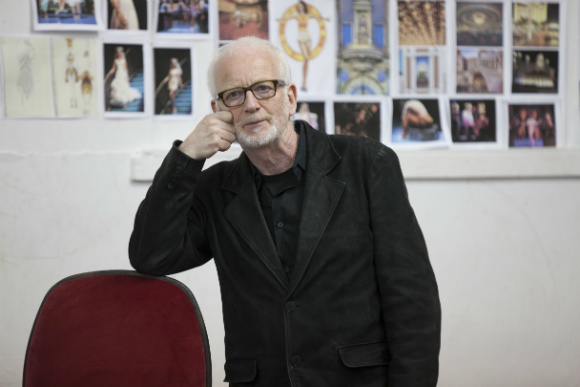The Merchant of Venice (Almeida Theatre)

© Ellie Kurttz
This is a brilliant, imaginative and totally engaging production of a play that, perhaps like Measure for Measure and All’s Well, becomes more fascinating to modern audiences with every passing year. The Merchant is no more anti-Semitic than The Shrew is misogynist, as any half-way decent production always makes clear; characters express those attitudes, but the plays no way endorse them.
Rupert Goold‘s Las Vegas make-over was first done for the RSC three years ago in Stratford-upon-Avon with Patrick Stewart playing Shylock in the third of their three vivid collaborations (after an Antarctic Tempest and the abattoir Macbeth); it’s now revived with Ian McDiarmid adding edge and rancour to the aggrieved money-lender, Scott Handy reprising his imposing, melancholic merchant Antonio and Susannah Fielding her sensational baby-doll Texan Portia, here the crux of the play and a seriously flawed, borderline insane and nasty piece of work.
Three million dollars, not three thousand ducats, are at stake as Antonio’s argosy founders at sea while Portia subjects her suitors to a "game show" casket scene on a live TV programme, Destiny. She’s an airhead bimbo, prodded towards extremes of her own stereotype by Emily Plumtree‘s conspiratorial Nerissa. The two of them feature prominently in an opening sequence in the Venetian money markets – a noisy gambling casino of fruit machines, blackjack, craps, show girls and an Elvis impersonator (Jamie Beamish) who turns out to be Lancelot Gobbo.
This transposition of the play’s mercantile world is no less metaphorically rich or valid than was Jonathan Miller’s to a Victorian stock exchange – a brown-suited, bespectacled McDiarmid has a clicking briefcase similar to Olivier’s in the trial scene – or Edward Hall’s to a paradoxically liberating jailhouse setting. And within Tom Scutt‘s fixed design of arches and a central stairway there are clear indications of the Venetian Rialto and the moonlit night at Belmont where the play’s frictions are resolved.
Or not, in this case. After his humiliation – Portia’s grasp of the conditions of the bond is a sudden panic attack as McDiarmid taps Handy’s naked torso, stripped of its Guantanamo-style orange boiler suit, with his knife blade – Shylock slinks away like an abandoned dog. Gratiano has "baptised" him with spittle and, at Belmont, Fielding’s Portia, confused by her disguised role as the lawyer Belario, shocked perhaps at her own redneck priggishness and at last fully apprised of the depth of Bassanio’s (Tom Weston-Jones) love for Antonio, goes a little strange.
Shylock has been torn apart from his daughter Jessica (nicely and tentatively done by Caroline Morris) and hoist on his own petard of righteous indignation. But the comedy of the rings, and the lyrical passages of Lorenzo (an all-American pin-up, Finlay Robertson) are soured by the vindictive application of the state’s justice. And anyone who thinks that in exposing anti-Semitism, even writing about it, Shakespeare is embracing it, can’t have been listening.
The Merchant of Venice runs at the Almeida Theatre until 14 February 2015












